- Home
- Linda Newbery
Missing Rose Page 7
Missing Rose Read online
Page 7
If anyone came to stay, Anna’s grandparents at Christmas, or friends – she couldn’t remember it happening often – Anna would have to sleep on the sofa downstairs, giving up her own room. No one could sleep in the sanctity of Rose’s room, in Rose’s bed. In the first days, weeks, months, Anna used to go in to stand in awe, or to gaze at Rose’s books and music and wonder what Rose had been reading or thinking or listening to, the last time she slept here. Rose’s absence was so strong that it became a presence, looming, oppressive.
At first, the door was kept open always. Mum would go in at nightfall to draw the curtains, and would open them again early each morning. The first phase of withdrawal was signalled by the closing of the door; a small thing, but it made the whole of upstairs feel different – narrower and darker. Sometimes, feeling furtive, Anna would open the door and peep in to see if everything was still the same. It was, but there were no flowers; the curtains stayed open, and the bed linen was unchanged from one week to the next. When her parents were out, she lay down, greatly daring, on Rose’s bed. Once she fell asleep there, only waking when she heard the slam of the car door outside; she sprang up, smoothed the bedspread and plumped away the indentation of her head on the pillow, fearful of being discovered.
Then, when Anna was sixteen, the shock of returning from school one day to find the radio on in Rose’s room and her mother busy with bags and boxes. The bed had been stripped; clothes were piled in heaps on the mattress.
‘What are you doing?’
On her knees, pulling a box out from the floor of the wardrobe, her mother must have been so absorbed that she hadn’t heard Anna unlocking the front door, or coming upstairs. She looked up, startled; her expression was that of a child caught doing wrong, quickly replaced by an air of tutting impatience.
‘Having a good clear out. What does it look like?’
‘Those are Rose’s things!’
‘I know whose they are. She doesn’t need them any more, does she? It’s a waste of a room. We may as well make use of it.’ Mum flashed Anna a defiant look. She might have been rebelling against a diktat imposed by someone else. ‘If you want any of these clothes, you may as well have them. You’re about the same size now.’
‘No!’ Anna affected shock, although she had on occasion borrowed items from Rose’s wardrobe when her mother hadn’t been around. ‘It’s not right, wearing her clothes.’
Rose had so many. No one had seen her leave, that hot August day; Anna, last to see her, had given details of what Rose was wearing – jeans and a green vest top – and she and her mother attempted to work out, by elimination, what Rose had taken with her. A rucksack was missing, and the sketchbook, and the tapestry bag Rose used for her purse, keys and other small items. Rose’s favourites were still in the wardrobe: the skinny black jeans, the denim skirt she’d customized with patterned patches, the green Indian top with flowing sleeves that Anna had helped her choose from a market stall. She hadn’t even taken the gemstone necklace Anna had given her last birthday; finding it in the muddle of a drawer, Anna had felt the sting of rejection.
Her mother shrugged and went on sorting. The cardboard box contained school books: exercise books in various faded colours, folders, ring-binders. She gave them no more than a cursory glance, then said to Anna, ‘Pass me one of those bin-bags, will you?’
‘You can’t throw those away!’
‘Why? What use are they to anyone?’
‘They’ve got Rose’s writing in them!’
‘So?’
Anna gazed helplessly at her mother, not recognizing this strange, curt mood. Mum wore an expression that was quite unfamiliar: chin high whenever she turned to speak to Anna, her eyes almost scornful. Now she picked up an exercise book and flipped through its pages without interest before reaching for the roll of bin-bags by the door.
‘Don’t!’ Anna protested. ‘I want to keep them. Here, let me look.’ She tugged at the edge of the box; her mother pulled it back, and for a moment there was a ridiculous tug-of-war which ended with the box tearing limply, the top layer of contents spilling out.
Mum shrugged. ‘Go on then. Take one or two if you must, but you can’t tell me you want all this history, maths, geography, RE.’ She frisbeed them at Anna, one after another. ‘Have whatever you want, but hurry up. I need to get this done.’
Anna took this to mean that she wanted to finish the job before Dad came in from work. If anything, Anna thought, he’d be pleased; it hadn’t been his idea to keep the room as a Rose-museum. But what would he make of such a drastic reversal? Uncertainly at first, Anna delved into the box. No, there was no point keeping them all; she rejected the maths and science books, filled with neat figures and writing and diagrams, sprinkled all over with the praise of red ticks and comments, Good work, Excellent, Well done! A thinner exercise book must have been Rose’s first, from her infant class. Rose Taverner. Writing Book, was written on the cover in a teacher’s careful hand, and Rose had copied her own name underneath, in wobbling letters. Anna took that one, a history book from the first year of secondary school, and the folder containing notes and essays for A-Level English.
Mum showed no interest in her selection, bundling the other books and folders into bin-bags.
‘You’re not throwing it all away?’ Anna asked. ‘The clothes and everything?’
‘No, I thought I’d give them to the church jumble sale.’
Neither of Anna’s parents was a churchgoer, but her mother helped Lesley, who lived next door, with the jumble sale and the Christmas craft fair, and with a plant stall at the summer fête. That first autumn, Lesley persuaded Mum to go to services with her, suggesting that she might find comfort. Mum was welcomed, and prayers offered for Rose and for the whole family. Dad never went with her, and neither did Anna; she thought it hypocritical, only turning to God, whoever or whatever you thought God was, when you wanted something. But neither God’s intervention nor more practical measures had brought Rose back, and the church attendance lasted only as far as Christmas.
Anna thought of strangers wearing Rose’s clothes. She might see people in the street wearing garments she’d recognize, like the denim skirt with patches. Strangers in Rose’s skirts or jeans – it would be like wearing a dead person’s clothes. Maybe they actually were a dead person’s clothes.
On the first page of Rose’s infant exercise book there was a crayon drawing. A group of figures, four of them, with stick limbs, bulbous heads and smiles like half-moons. They were drawn in descending order of size, going down to a baby on the ground, resembling an Easter egg with a face. Rose had drawn herself with long black hair and a smile like a banana. Overhead was a blob of yellow sun, and even that was smiling. Underneath, the teacher had printed four names, and Rose had copied them underneath in wavering purple. Daddy Mummy Rose Anna.
Now, daring to sit on the bed, Anna thought: of course Mum won’t leave. Why did we ever think she would? There was only one chance to leave, and Rose took it.
The clothes and the books had never got to the church jumble sale; they were still here, bagged up, in the cupboard and the wardrobe. They’d made it as far as the car boot before Sandra had changed her mind and carried them all back inside.
In recent years Sandra had taken up fabric-work – ‘creative embroidery’, as she called it. Her desk, sewing machine and workbasket were here, her silks and buttons and whatever she needed for her current project – a frame maybe, or stuffing for a cushion. Whether she sat for hours in Rose’s old bedroom merely in order to put the room to practical use, or whether she saw it as unspoken communion, Anna often wondered. It had made her father uneasy at first, but his way was to humour her mother in everything she did. To challenge or question would mean bringing the taboo subject into the open.
Anna took off her shoes, lay down on the bed and stretched out. If she heard footsteps coming up the stairs, she would scuttle back to her own room.
Her mobile rang in her bag. She picked it up: Martin. ‘Hi –
are you at your parents’ now? Are you OK?’ He never used endearments like darling or sweetheart – neither did she – but his voice held no reminder of their earlier exchanges. ‘Is Sandra ill?’
Anna remembered the note she’d left. ‘No, it’s all right. She’s just … Dad thought she was behaving oddly. She wants to call off the move.’
‘No! Well, the two of you can talk her round.’ He sounded sure of that. ‘So you’ll be back tomorrow? Actually I need to speak to Don about his investments, but I’ll ring again on the land line. See you latish, then, tomorrow – I won’t be in till gone eight. Send me a text.’
‘Will do. Bye then. Take care.’
Anna ended the call, and the silence of Rose’s room settled around her. Moments later she heard the phone ringing downstairs, and her father answering.
Is that it? Rose whispered. Your man, your relationship? Is that good enough? Are you really settling for that?
Standing, Anna slid her feet into her shoes. ‘Shut up, Rose,’ she said aloud. ‘Leave me alone.’
September 1988
Anna was trudging along Ashurst Avenue, her school bag heavy on her shoulder. Usually, when she walked with Melanie until they parted at the corner, it didn’t seem so far, but Mel had gone to the dentist this afternoon and Anna was on her own. She was conscious of every step, the road stretching ahead and the sun beating down so hard that it must surely be scorching her scalp where her hair parted. The new school uniform she was so proud of, navy skirt and blazer and a white shirt, was hot and itchy. Her tie was in her rucksack, but she kept her blazer on because carrying it over her arm would be more of a nuisance than wearing it.
Ashurst Avenue had a row of identical brick houses on one side, and a wide expanse of recreation ground on the other. At the nearest corner as Anna approached, a play area was fenced off for children: a climbing frame, seesaw and swings. From the pavement, mud paths, trodden hard and grooved by cycle tyres, swooped into a dip and up again to the grass. At the edges of the park there were hidden places behind the trees where the grass was left uncut. People picked blackberries there at this time of year, and conker shells scattered the path, showing their pale insides. Anna scanned the ground for conkers, and picked up a big glossy one to hold and turn in her hand before slipping it into her pocket.
In her bag was a bottle with orange juice left from her lunch, and a Milky Way. And there was a magazine Melanie had lent her, with things in it Anna would look at later, out of Mum’s sight, upstairs in her room. ‘Look at this,’ Mel said in the form room at break, opening it at a double-page spread, with a delighted giggle in her voice. There was a photograph of a naked couple, soft-focus, wrapped round each other. They were standing, and you could see the whole of the woman’s back and her bottom, round and soft like a peach, but all you could see of the man was his arms and hands and part of one leg, and his sideways face as he kissed her neck. His eyes were closed, his arms dark and hairy against the paleness of the woman’s skin.
Anna felt hot and clumsy, looking at it. Her hands were too big.
‘Where did you get it?’ she asked Melanie.
‘It’s Jamie’s. He doesn’t know I’ve got it. I took it from his room.’
Mel’s brother was in the fifth form, like Rose. If only Anna didn’t feel so small and new – she felt as if she’d shrunk, since being in the top class at primary school – she’d have thought herself clever and important for being in the same school as them, wearing the same uniform, having some of the same teachers.
She flipped back to the cover. ‘But it’s a girls’ magazine!’
‘A lot of boys read girls’ magazines,’ Mel said knowledgeably. ‘They do it to find things out. Go on, read what it says!’ she urged. ‘It tells you all about – you know – how to do it. How to be good at it.’
Anna had only recently realized that It was something you had to be good at; Mum’s version, when she had explained it to Anna, was that you did It to get a baby. She looked up at the commotion of two boys barging into the classroom, Jason Wiles and Andrew Morrison, shoving each other, knocking a chair aside in a play-fight. Melanie and Anna exchanged glances; Melanie scrolled the magazine quickly and stuffed it into Anna’s bag, under the desk. ‘You can take it home,’ she whispered. ‘Make sure you bring it back tomorrow.’
If Anna read the magazine in secret, in her bedroom, Mum would know. Her X-ray eyes would see through the wall, and she’d be cross and frosty; Anna could tell Mum didn’t like what she called that sort of thing, from the way she went all tight and sniffy when it happened on television. Anna could never imagine her doing it with Dad, but maybe they’d only done it twice, once for Rose and once for her. If Mum found out about the magazine, Anna would feel dirty, bad – but still she did want to read it, have it all to herself, look at that picture again. She felt it burning through her school bag, scorching where it touched her. Her secret. Then she had a better idea. She could look at it now, in the park; later she’d hide it under her bed till tomorrow, in case Mum decided to look in her school bag to check she’d got everything, or to put in an extra muesli bar for her packed lunch.
The soles of her lace-up shoes slapped the mud path as she crossed into the park. No one was here. Anna sat on the bench and took out the orange juice and the Milky Way, which had gone squidgy in the bottom of the bag, and arranged them like a small picnic. Then she took out the magazine. Although there was no one in sight she had to glance around to check, in case a disapproving adult – a neighbour or someone Mum knew – should loom out of the bushes: Just what do you think you’re doing, young lady?
Stalks of dried grass brushed her bare legs; the wood of the bench was warm through her skirt. She fumbled the pages of the magazine. It was so hot today that – if she thought no one would see – she could have taken her clothes off and let the air brush her skin. She imagined the warmth of wood against her bare bottom. The hot, tingly feeling made her limbs feel fuzzy. She felt daring and secretive for having such a thought.
Someone was coming. She rolled the magazine tight as a tube and thrust it into her bag, unwrapped the Milky Way and started eating it, swallowing too quickly; the sweetness caught in her throat, making her cough. She heard a girl’s voice, high and distressed. Two people were coming fast along the footpath that led into the park from the far side, a boy and a girl. Over the hedge Anna could see them from the shoulders up, their shirts bright white against the hedgerow. The girl was running, the boy chasing her: they were only playing. When the girl burst out into the park, Anna saw the swirl of long hair and her wavery way of running. Rose.
Rose mustn’t see her. Anna pushed the chocolate wrapper and the bottle into her bag, and was about to dart off behind the hawthorns and carry on walking home when she noticed that Rose was crying. Really crying. She ran across the park without seeming to notice Anna.
‘Rose! Wait!’ the boy shouted. A tall dark-haired boy. Jamie Spellman, whose magazine it was. Mel’s brother. Anna had seen him with Rose before but hadn’t known him make Rose cry. Perhaps Rose was upset because he wanted to try out those things he’d read about. He wanted to practise on her, in a private, secret place out there in the fields where they could lie down together with no clothes on while his hands went all over her. Where they could do It. It must be his fault.
She was heading for home, coming Anna’s way, running blindly with an arm raised to cover her face. Jamie was gaining on her. He sprinted close enough to grab her arm, and turned her to face him.
‘Leave her alone!’ Anna shouted hotly. ‘Leave my sister alone!’
They both turned, startled. Jamie released Rose.
‘Anna!’ Rose’s face was streaked with tears. In her frightened little-girl voice, she said, ‘It’s not Jamie’s fault. I made him do it.’
‘Made him do what?’ Anna was still thinking of the magazine picture.
‘Made him kill it,’ Rose whispered.
‘Kill what?’
‘There was a rabbit,’ Jamie
said, scuffing a foot on the grass. ‘It had that rabbit disease, what’s-it-called, that makes their eyes go funny.’
‘Myxomatosis.’ Her voice muffled, Rose made it sound like bixabatothith; Anna almost laughed. Rose’s eyes searched her face; she wants me to cry too, Anna thought.
‘It was horrible,’ Rose whimpered. ‘The poor thing. Its eyes were all blobby and sore where it had been rubbing them. It was all mangy-looking. It didn’t even try to run away from us. I picked it up.’ She was rubbing her hands on her skirt, the backs and the fronts, rubbing off traces of rabbit, of disease.
‘They only die,’ Jamie said. ‘The best thing you can do is kill them. Rose told me to, so I did it.’
‘How did you do it?’ Anna asked, fascinated. ‘You haven’t got a gun.’
‘You don’t need a gun, stupid. I hit it on the back of the neck,’ Jamie said, with a flash of pride.
‘I watched him. I didn’t want to, but I did,’ Rose said, her eyes filling again. ‘He held its ears forward and he hit it—’
‘Like this,’ Jamie said, making a swift sideways chop with one hand. He looked at Anna to see the effect of his action. His eyes were pale blue, with clear whites. She imagined her own neck receiving the force of that movement that sliced the air like a karate chop.
‘– and that was it. Dead. It didn’t have time to squeal or anything. It twitched a bit, then went limp and soft. I hid it in the brambles. I couldn’t bury it – the ground’s too hard and I had nothing to dig with, but I found some flowers. Oh, Anna!’ Rose draped her arm round Anna, leaning. Her hair fell around Anna like a shawl, the way it did when they played at being Rosanna. She was limp and soft like the rabbit; if Anna stopped bracing herself, they’d both collapse to the ground. ‘The poor thing. Its eyes …’

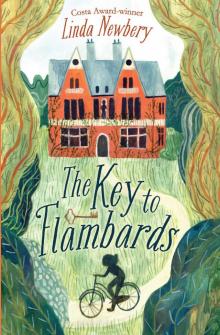 The Key to Flambards
The Key to Flambards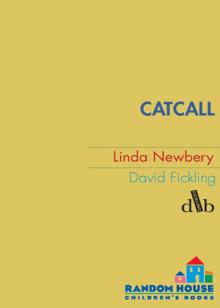 Catcall
Catcall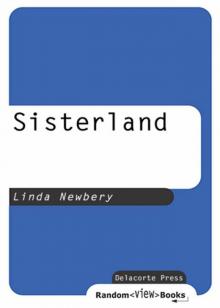 Sisterland
Sisterland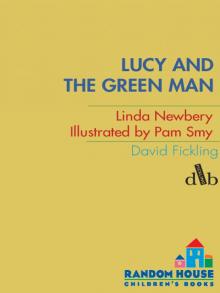 Lucy and the Green Man
Lucy and the Green Man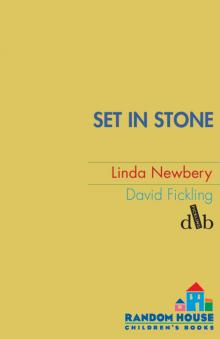 Set In Stone
Set In Stone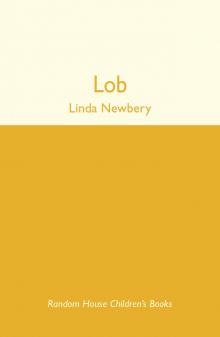 Lob
Lob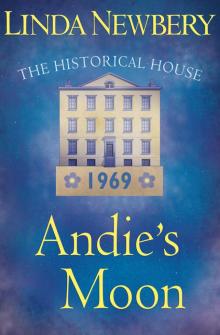 Andie's Moon
Andie's Moon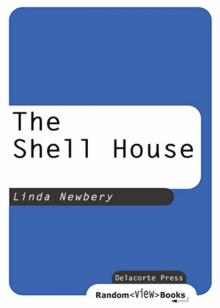 The Shell House
The Shell House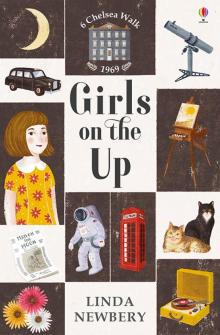 Girls on the Up
Girls on the Up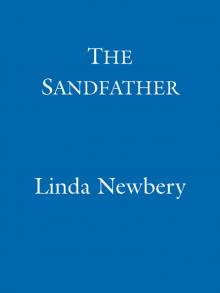 The Sandfather
The Sandfather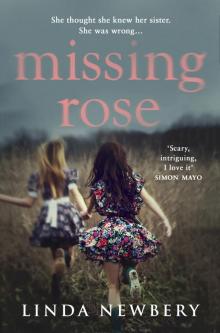 Missing Rose
Missing Rose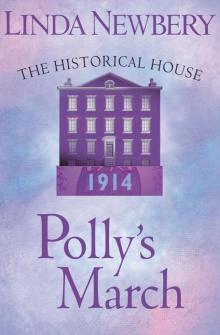 Polly's March
Polly's March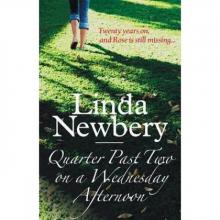 Quarter Past Two on a Wednesday Afternoon
Quarter Past Two on a Wednesday Afternoon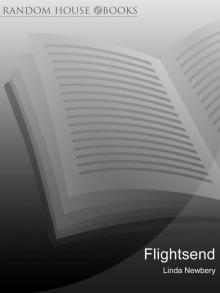 Flightsend
Flightsend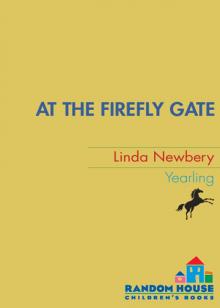 At the Firefly Gate
At the Firefly Gate